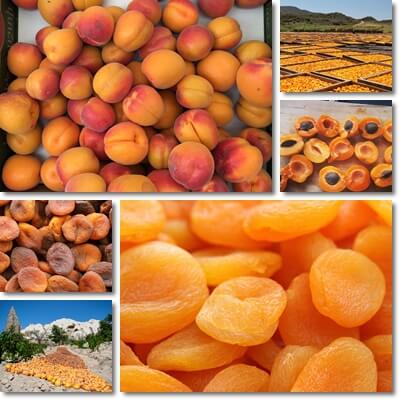Not only can diabetics eat dry apricots with their condition, but the dried fruit is also good for diabetes when consumed in moderation. Despite being high in carbohydrates, dry apricots have a low glycemic index value which means they don’t raise blood sugar levels too fast. Of course, only limited amounts may be consumed at once, according to each diabetic patient’s individual nutritional requirements. Large servings of over 30 g of the dried fruit cancel out the benefits of a low glycemic index and cause blood sugar levels to rise instead. Eating small amounts at once ensures the benefits remain.
What are the benefits of dry apricots for diabetes? Dry apricot nutrition favors several benefits specifically for diabetes. Generous amounts of pro-vitamin A antioxidants help eyesight and boost immunity, two important aspects of diabetic health. The vitamin A resulting from carotenoid antioxidants together with impressive amounts of the antioxidant vitamin E contribute to skin health. Generous amounts of vitamins B3, B5, B6 and smaller amounts of vitamins B2 and B3 make dry apricots good for nervous system health, helping with diabetes-associated nerve-damage.

Potassium helps lower high blood pressure in diabetics while iron boosts muscle vitality and ups energy levels. Fiber encourages weight loss and supports a healthy weight as well as holds hypoglycemic effects. And, as studies show, various antioxidants in the dried fruit, including the well-known vitamin E, pro-vitamin A antioxidants and other polyphenols further provide hypoglycemic or blood sugar-lowering benefits for diabetes type 2 in particular. Of course, benefits are highly dependent on intake but, in the case of dried apricots, the lower the intake, the better so as to avoid high blood sugar. Here are 7 great and real benefits you can expect to enjoy if you eat the dried fruit in moderation with the metabolic condition:
1) Doesn’t raise blood sugar levels too much
Dry apricots have a high carbohydrate content ranging from 28 to 62 g of carbs per 100 g of dried fruit or 9 to 20 g of carbs per 30 g serving (depending on moisture content). But they also have a low glycemic index value (30, 30+) which means effects on blood sugar are minimal when you eat small amounts. So even if blood sugar does go up, the rise is not excessive (provided intake is limited).
2) Minor hypoglycemic effects
The blood sugar-lowering effects are a result of a good fiber content (up to 3 g of dietary fiber in a 30 g serving of dry apricots and up to 7.3 g per 100 g), higher fructose-glucose ratio (up to 50% fructose), antioxidants and other elements in the fruit with hypoglycemic properties as well as the firm and sticky texture of the dried fruit. Dietary fiber slows down digestion and the rate of sugar absorption into the bloodstream, hence its contribution to a low glycemic index.

Studies show fructose from whole fruits, both fresh and dried, has positive effects on insulin resistance and helps improve both insulin response and blood sugar control after a meal. According to research, as long as intake is kept below 10 g of fructose per meal or 36 g per day, there are no adverse effects on blood lipid profile and cardiovascular health (Sievenpiper JL, Chiavaroli L, de Souza RJ, et al. (2012) ‘Catalytic’ doses of fructose may benefit glycaemic control without harming cardiometabolic risk factors: a small meta-analysis of randomised controlled feeding trials. Br J Nutr 108, 418–423 [PubMed]).
Polyphenols – antioxidant and anti-inflammatory elements, vitamins and other elements further exert a minor hypoglycemic activity. Vitamin E, for example, has been found to improve blood sugar control in type 2 diabetes and dry apricots provide 4.33 mg for every 100 g of fruit which is almost 30% of the recommended daily intake (RDI) for an average adult. A serving of 30 g will provide around 10% of the RDI. Lastly, the firm, almost tough consistency of the dried fruit further contributes to its blood sugar lowering properties (the more chewing it requires, the more difficult it is to digest and the more it slows down the rate of sugar absorption).
3) Good for diabetes-associated high blood pressure (hypertension)
100 g of dry apricots provides 1162 mg of potassium which is a little over 25% of the entire recommended intake (RDI) of the mineral per day for an average adult. A serving of 30 g gets you approximately 8.3% of the RDI. Potassium is essential for healthy blood pressure numbers and dry apricots make a good choice even for diabetics with hypertension. Magnesium is also important, but dry apricots magnesium content is relatively low – only 32 mg per 100 g of fruit, or 8% of the RDI. A serving of 30 g will provide about 9.6 g of magnesium or 2.5% of RDI.
4) Good for eyesight
Dry apricots are especially good for eyesight and promote good color vision and night vision as well as improve visual acuity and slow down the progression of degenerative eye damage. They may also offer a certain level of protection against diabetes-associated retinopathy and loss of vision. They do so as a result of a generous content of vitamin A from carotenoid antioxidants, mostly beta-carotene. 100 g of dried fruit has 180 micrograms of vitamin A or 20% of the recommended daily intake (RDI) for an average adult.
Good to know: Vitamin A is a fat soluble vitamin which means it requires dietary fat to be properly absorbed. The vitamin A precursor beta-carotene and other carotenoids also rely of fat for a maximum absorption rate. So if you want to enjoy the benefits of dry apricots for diabetes-related eye problems, it’s best to have the dried fruit with a source of fat – nuts or seeds if you are not allergic, cheese, lean animal protein or even cooked in some vegetable oil.
5) Source of B vitamins for diabetes-associated neuropathy (nerve damage)
Diabetes is essentially a continual state of hyperglycemia, or high blood sugar levels. Because of either insulin production deficiency or deficiencies in insulin receptors, sugar we get from carbohydrates from food stays for too long in the bloodstream. Over time, this leads to damage, including nerve damage. Dry apricots are good sources of several B vitamins which help nerve damage associated with the metabolic condition.
100 g provides around 2.589 mg of vitamin B3 (niacin), 0.143 mg of vitamin B6, 0.516 mg of vitamin B5 (pantothenic acid), 0.074 mg of vitamin B2 (riboflavin) and 10 micrograms of vitamin B9 (folate). This accounts for approximately 16.6% of the RDI of vitamin B3, 10% of B6 and B5, 6% of B2 and 3% of B9.
6) Benefits for skin
Generous amounts of vitamins A and E as well as B vitamins all promote skin health and hold benefits including for diabetes such as helping with wound healing. Vitamin A has immuno-modulating effects and stimulates the immune system to fight off infections which may affect the skin. It further promotes skin cell regeneration with positive effects for wound healing, while vitamin E exerts strong antioxidant effects and helps skin retain moisture. B vitamins together with vitamins A and E counteract dry skin which may reduce infection risks.
7) Energizing, supportive of a healthy weight
Including small amounts of dry apricots in one’s diet instead of other unhealthier food choices can initiate weight loss and support achieving a healthy weight. Such effects are partly a result of the good fiber content of the dried fruit which regulates digestion and nutrient absorption, effects extending over other foods as well. Eating small amounts of the likes of 30 g servings further ensures a limited calorie intake of only 73 kcal.
Furthermore, the predominance of carbohydrates makes dry apricots a good source of energy which can be used immediately for exercise. A good source of B vitamins and rich in iron (2.66 mg per 100 g or about 20% of an entire day’s requirements), dry apricots boost energy levels, muscle vitality and have a revitalizing effect and are thus supportive of a healthier, more active lifestyle that promotes weight loss.
